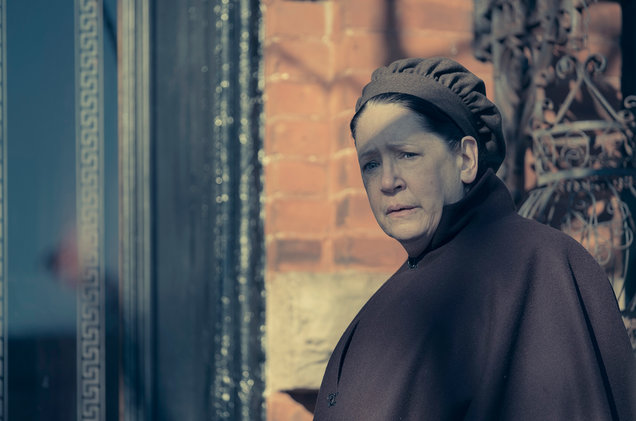No TV recapper is clairvoyant, and none of us can accurately predict a universal reaction among millions of viewers. We know that a portion of viewers will not share our reactions to the plot points and character interactions in any given episode. The finale for Season 1 of The Handmaid’s Tale left viewers shouting to know what would happen next. The finale for Season 2 may have them shouting “What the f---!” The actors, as always, do a stellar job selling their material. Why, then the WTF? It’s because, in the final minutes of “The Word,” June does something that makes little sense. Here are all the major moments leading up to June’s flabbergasting choice.
Eden’s Things. We open in the Waterford yard, where Offred and Rita are doing laundry, all of it gray and white: they’re cleaning and packing Eden’s things to send home with her father, Mr. Spencer. Rita and June both feel guilty about how they treated Eden. To be fair, Eden was a derpy little pain, and they were all afraid of her because she seemed likely to inform on them. June finds evidence of Eden’s concealed individuality among the econowife accoutrements: an inlaid wooden box, a teddy bear, a photo of Eden with her little sister and…a Bible, full of notes in a beautiful, light, slanted script, and ink drawings of flowers. All that time when she appeared to be a pious little paragon on Gileadean obedience, Eden was committing a persistent act of subversion by reading her Bible and taking notes.
She Cannot Read His Word. Serena Joy wanted a baby. But babies grow up. June questions Serena’s ability to protect baby Holly/Nicole, bravely taking the book to Mrs. Waterford in the greenhouse and pointing out that Eden was trying to understand God. Unsurprisingly, Serena Joy blames Eden. June doesn’t back down. How, she asks, will Nicole understand the word of God when she is not allowed to read it?
Eden’s Father Turned Her In. Eden must have been horribly lonely until she met Isaac, with no means of communicating with her parents or her sister, and a distant husband who avoided her company. It must have been heartbreaking for Eden when her own family turned her and Isaac into the authorities when they arrived at the Spencer farm. Purity and the state were more important to them than her survival. Fred is a judgmental jerk to Eden’s father, while Serena is gentle and sympathetic to Mr. Spencer. This is a 180 from early in Season 1, when Serena seemed like the harsher Waterford, and Fred came across as a conflicted guy with some guilt issues.
The Slap Heard Round the Room. “What are you gonna do when they come for your daughter?”, June asks Fred as he walks to the parlor door. He closes the door and slaps her hard across the face. His violence is unsurprising. There’s nothing unusual about a woman being slapped in Gilead, but a man getting slapped by a woman is noteworthy. And that’s exactly what happens next. June is fearless. She slaps Commander Waterford across the face so hard that his hair flies loose from it waxy pomade.
Fred responds by grabbing her face and misquoting a biblical verse: “The mouth of a woman is a deep pit / He that falls therein will suffer / You are the misery of all men.” A cursory Google search will reveal that the first line is a paraphrasing of Proverbs 22:14, and that Fred has left out crucial adjectives that vary between translations, and that the phrase “You are the misery of all men” is not a part of that verse from Proverbs. It isn't even in the Bible. Fred is making things up to suit his own purposes. His words serve as a reminder that women in Gilead face permanent, surgically enforced silence for talking back. What if Offred is in danger of having her tongue cut out like Ofglen II/Lillie Fuller? Elisabeth Moss can carry episodes on face acting alone, but please don’t force her to. June is way too good at repartee.
Meet Daddy. June and Nick finally have a family tableau moment alone with Holly while Rita keeps guard. They almost look like a normal family if you overlook the bonnet, but every second feels perilous. June finally tells Nick that she loves him. June still loves Luke, too. Life in dystopia is messy.
Emily Thawing. The next two scenes are all about two classes of women, first handmaids and then wives, sorting out their reactions to Gileadean Romeo and Juliet. June, Emily, Janine, and a silent rando handmaid encounter Isaac and Eden’s bodies hanging from the wall on their walk by the Charles River. They once seemed like the last ones likely to wind up there. Emily would have hated Eden if they had met, but that’s probably not important now. Emily has been anti-social since she got back from the colonies, but she’s finally reconnecting with June and bickering harmlessly with Janine. Emily admits that she’s happy that she got to come back and see June again, and that she keeps dreaming about her son, Oliver.
A Life With Purpose. Meanwhile, in the respectable Putnam house, Serena and Naomi have a deeply coded conversation about their daughters’ prospects in Gilead—so deep coded that, stripped of context and emotion, it would seem that they were merely exchanging platitudes and small talk. Even having a coded, italicized conversation is taking a risk, as well as exercising their privilege as wives. It’s not shocking that they’d be worried about their daughters. The wives were all privileged before Gilead. Eden was a window into what they could fear for their daughters. I would love to hear what the wives had to say. Frankly, I can think of a bunch of seconds here and there that I would happy to cut in order to hear a couple minutes what they were saying to each other, in light of what happens later.
Unceremony. Emily has nothing left to lose, so she takes it upon herself to play the avenging angel. Either she’s determined to not be raped again, or she wants to make sure that Bradley Whitford’s Commander Joseph Lawrence is punished for coming up with the colonies. However nice he is personally, he created death camps, and that makes him a war criminal. She arrives for the Ceremony with knife in hand. It’s a serrated knife, likely a steak knife, in the latest allusion to meat and cows. Emily is afraid. She’s very afraid. She also has a spine of steel.
Several things are off in the room, as per usual in the eccentric House of Lawrence. There’s no sign of Mrs. Lawrence in the room, and the Small Faces' psychedelic, assertively cheerful “Itchyoo Park” plays in the background. Lawrence is annoyed that his Martha, Cora, isn’t around to fetch him orange juice, wonkily griping about the flawed economics of unpaid Martha labor: “See, this is the problem. How am I supposed to motivate employees if I can’t leverage salaries? Herzberg, huh!” The ceremony never happens. Lawrence brushes it off, telling Emily, “I’m not gonna do that with you.” He’s so brusque that he almost seems rude for doing her a mercy. Then again, no woman should ever have to feel grateful for not being raped. Not being raped should be a pretty basic expectation.
Serena’s Amendment. The wives’s bid to stand for women’s literacy is made, not in the name of women’s rights, but for the sake of religious education. Still, Serena and the wives’ rebellion is thrilling to watch. “The Holy Scripture is a miracle. It is a gift given by Him to all of Humanity. We believe that our sons and daughters should be taught to read it.” The women assumed that, together, they would be enough. Serena assumes, wrongly, that Fred is on her side and that she still commands respect through him. Serena orchestrated the dramatic arrival of the women beautifully. It doesn’t matter.
Serena was known as an effective speaker, once. She is still a compelling speaker. The problem is that she created a world where nothing she says matters. Her decision to whip out Eden’s Bible and reads from the beginning of Genesis is a surprise to the wives. Serena is daring them to punish her. Serena is fearless. Or she believes that she retains more influence than she really has. The men glance at Fred accusatorily, because he can’t make his wife behave. The men don’t care whether the women know the word of God. The only thing they want is blind, meek, unquestioning obedience.
As odious as Naomi Putnam has been, she deserves credit for being one of the wives to stand by Serena in the council room when the other wives walk out, but scolds her, “You shouldn’t have done that.” “Be bold, and mighty forces will come to your aid,” Serena replies. The wives don’t even know who she’s quoting, because they have no way to look it up. They would have to ask a man. They’d have to believe what he told them, whether he was right or not. It’s not like they can look it up for themselves.
An Example For Our Daughter. Fred is super patronizing to the women in the chamber anteroom. Serena never should have nodded for the other women to leave. The problem with their marriage is that they are no longer equal. Serena expects him to be on her side, and explains that she did it to set an example for Nicole. Notable, she touches him warmly on the arm. It’s the first time that Serena has touched her husband with any affection since he whipped her in episode 8. It’s a shock to her when he has the guards haul her away screaming. She set the opposite of the example she had been hoping to set. The other wives are unlikely to listen to her now that she’s been punished.
Aunt Lydia’s Tumble. Commander Lawrence lied on Emily’s behalf, telling Aunt Lydia that the Ceremony that never happened went splendidly. Emily has integrity and a knife. And she stinks at telling people what they want to hear. Aunt Lydia made a mistake when she called Emily “perverse and degenerate.” Emily knifes Aunt Lydia in the back. Yeesssssssssssss! To be fair, who wouldn’t want to put a knife in Aunt Lydia? Emily looks happy, and keeps kicking Aunt Lydia down the stairs. Cora throws Emily into her room. Alexis Bledel silently runs through a stunning range of emotion. At first, she seems psyched and gleeful, like she can’t believe she did it. Wanting Auntie Lydia dead feels like the most natural thing she could want. Then, fear, because there’s no telling what could happen to her next.
Aunt Lydia will never hurt a handmaid again, unless she survives. Aunt Lydia is most likely not dead. Her lips were still moving when the camera cut away, and Cora said to call for an ambulance. Lydia is too good of a character. User demand for an Aunt Lydia backstory is too high for her to die without a backstory.
The Penalty is a Finger. Fred brings a dazed Serena home minus her left pinky finger. Her gold wedding band clinks as she drops it on the marble-topped table. Note: the dropping of a wedding band is always symbolic on TV. Serena had the rebellion we’ve been waiting two seasons for, and was punished for it. She also lets June comfort her, which she couldn’t bring herself to do after the beating in ‘Women’s Work’.There’s no prediction where her path will go in Season 3; she has a record of springing back worse than before following growth moments, and the wait for her feminist awakening is like waiting for Peanut’s Lucy to let Charlie Brown kick the football. She’s Lucy, right down to the blue dress. She may finally be close with June, but she could also become even more tyrannical in reaction to her own lowered status.
Rules Can Be Bent. Fred sets a new smarminess benchmark in “The Word”. Fred needs to feel powerful. He won’t bend rules for Serena, but he would bend them to keep Offred in the house, “An obedient handmaid might be able to stay in this house,” and later dangles the possibility of more visits with Hannah. All it takes is obedience. He says “we could try again for a boy this time,” knowing that Nick is Holly’s father; Fred believes that June didn’t overhear his squabble with Serena at the McKenzie house. He doesn’t even care about his ability to follow his our hype—so long as he has a pliant sex toy and obedient handmaid who keeps cranking out little “Waterfords,” why should he care if they aren’t his?
Walking on Broken Glass. “I didn’t get to say goodbye! It was nice knowing you,” Mrs. Lawrence calls put as Commander Lawrence hustles Emily down the stairs. Dammit, I will miss this couple if they aren’t back next season. His selection of “Walking on Broken Glass” during the ensuing car ride feels a little too on point for Emily. Commander Lawrence does a funny little hand dance in time with the windshields. Emily, not amused, asks him to turn it off. Ok, some people find that song annoying, and Lawrence appear to have a taste for discordantly upbeat pop classics.
The Martha Network. It’s weird how Marthas keep not appearing when called, which happens at least twice in this episode. It’s almost as if they’re having secret meetings. Who knows how much expertise is concealed within their ranks? Remember, one of the world’s top pediatricians was serving as a Martha. We’ve been conditioned to view them as part of the background, because we’re viewing the show through the lens of the commanders’ households, where they are servants and thus invisible. More of the Marthas next season, please. I want to see Marthas interacting with each other. Society never notices the underclasses. The Marthas have their shit together. I was impressed with the efficiency and effectiveness.
We knew from the prior season’s finale that “the Marthas have their own networks.” Now we see it in action, and it’s impressive. Mayday had over two months to move June to Canada, and they couldn’t pull it off or prevent compromise of the safe house. The Marthas were able to organize a distraction and an escape plan for June and her baby on short notice. Mayday sends packages of letters that take over half a year, and has pulled off exactly one successful attack in the course of the show.
Nolites Tes Bastardes Carborundorum Redux, Bitches. Offred replaces the old “Nolites Tes Bastardes Carborundorum” graffiti in big letters on the wall of the her room on the way out. Try sanding that off. Just try it.
Serena’s Blessing. Serena Joy is basically admitting that the world she created for the sake of children is a bad place for children when she tearfully lets June escape with the baby amidst the distracting fire. What would Serena have to look forward to? She would likely lose Nicole to marriage at 15 and then the girl could go the way of Eden. Serena's goodbye prayer is one that Jewish parents traditionally say for their children. It seemed like Serena took forever to say goodbye to the baby. Was she trying to stall for time out of reluctance and ambivalence? We’ve already seen Serena betray our hopes after seeming to make progress.
Emily Gets Out. It’s unclear how Lawrence will explain the bleeding Aunt with a knife in her back, or how the Marthas knew to deliver June and Holly to the overpass where Lawrence’s car meets a big black van, presumably bound for Canada. To clarify, Lawrence says: “I’m getting myself in deep shit.”
We could get more Clea DuVall next season as Emily’s wife, Sylvia, last seen at Logan International Airport, headed towards a flight to Montreal. Will Sylvia have moved on? How would they deal with all of the terrible thing that have happened to Emily, or the likelihood that she can no longer experience sexual pleasure? Emily is going to have a whopping case of PTSD.
WTF, June? After all of the danger that the Marthas, Serena and Nick put themselves in to free June and Holly, she wastes it by choosing not to escape with Emily. The explanation could be in her flashback, where June sings The Velvet Underground’s “I’ll Be Your Mirror” to a young Hannah, with Luke framed in the doorway. June chooses the memory of her old perfect family over her current messy one. Her focus on Hannah is so all-consuming that it leads June to forget her responsibilities to Holly and all the people who helped them leave.
It’s been said that “I’ll Be Your Mirror” is about codependency, and the original version off The Velvet Underground and Nico has a creepiness to it as sung in Nico’s memorable, Teutonic drone. The desire to be all things for another person, as described in the lyrics, is something that no person can amount to: “I’ll be your mirror, reflect what you are / In case you don’t know / I’ll be the wind, the rain and the sunset / A light at your door, to show that you’re whole.” No one can healthily be all that to another person, even in the metaphorical sense, not even a parent. Of course, it’s also a very pretty song. But it’s a dark thing to sing to a kid.
June slips the photo of Hannah into the baby’s blankets, and tells Emily to call the baby “Nicole.” This is could be a tribute to Serena, or an emotional detachment from her child. June follow a memory instead of the real, helpless baby in her arms. June couldn’t decide between her daughters, so she put herself in a position where she could help neither of them. She abandons Holly after all the fuss this season about how babies need their mothers.
There will be consequences for June’s actions. The final expression on her hooded face is diabolical and unreadable. Her choices no longer make any sense. It could be that June hatched a master plan while hiding in the grass. It could be that June is not heading back to the Waterford house. She could be looking for Hannah’s adoptive parents, the McKenzies. If it’s her plan to find the resistance and rain holy hell on Gilead, she’ll need a better costume than her red handmaid’s cloak.








